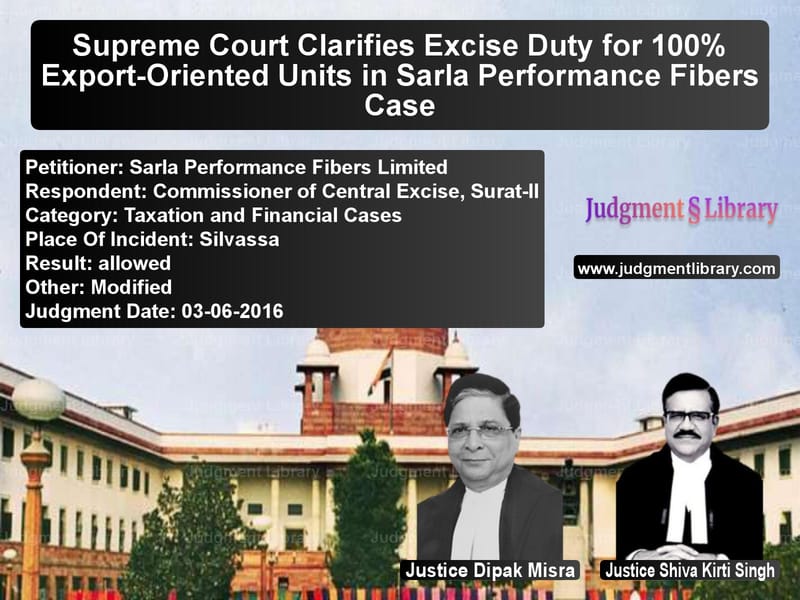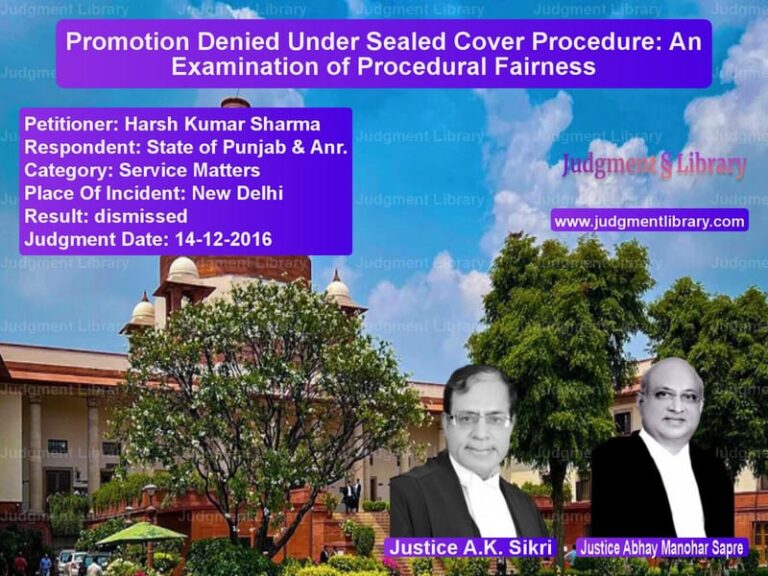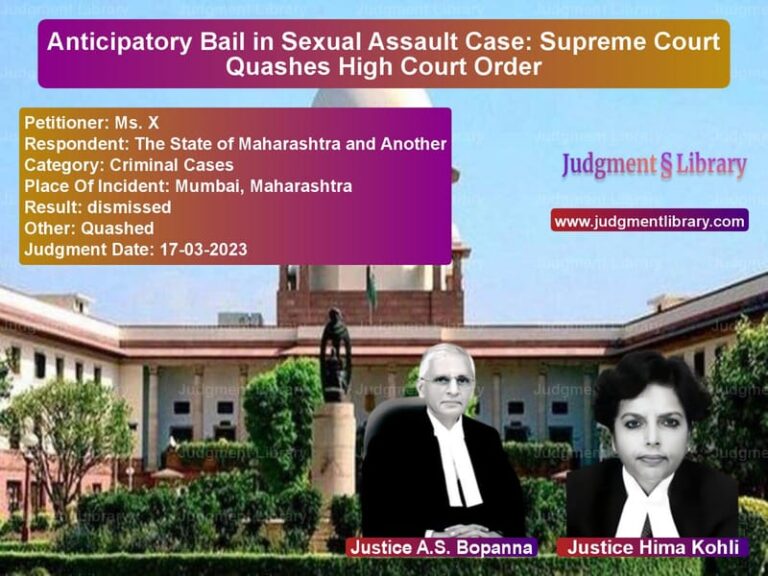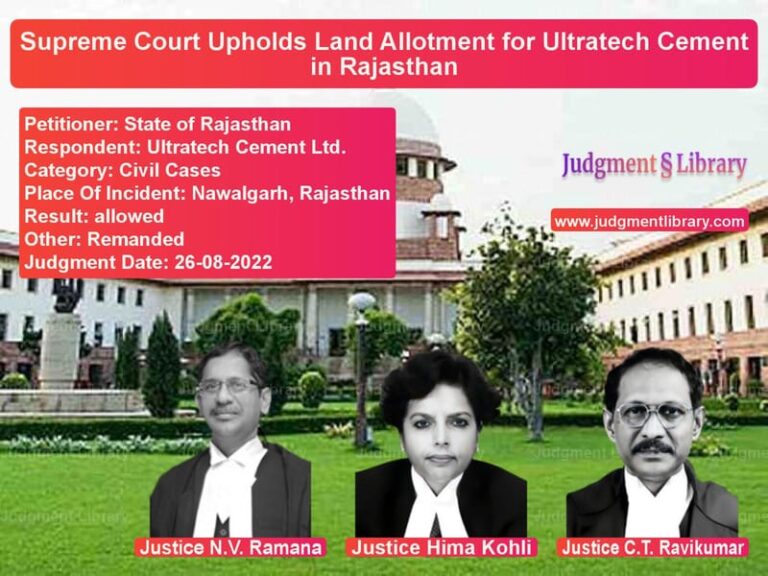Supreme Court Clarifies Excise Duty for 100% Export-Oriented Units in Sarla Performance Fibers Case
The Supreme Court of India, in the case of Sarla Performance Fibers Limited v. Commissioner of Central Excise, Surat-II, ruled on a crucial taxation issue concerning the levy of excise duty on goods manufactured by a 100% Export-Oriented Unit (EOU) and sold in the Domestic Tariff Area (DTA). The Court provided clarity on whether such sales attract duty under Section 3(1) of the Central Excise Act, 1944, or under its proviso.
Background of the Case
Sarla Performance Fibers Limited, formerly known as Sarla Polyesters Ltd., is a manufacturer of excisable goods, including synthetic yarn. It operates a 100% Export-Oriented Unit (EOU) at Piparia Industrial Estate, Silvassa, engaged in manufacturing polyester texturized yarn, nylon covered yarn, and polyester covered yarn.
The dispute arose when the company procured Partial Oriented Yarn (POY) without paying duty for manufacturing its products. The Excise Department issued a show cause notice, demanding an excise duty of Rs. 32,92,854 for allegedly removing texturized yarn without payment of duty.
Following investigations, the Commissioner of Central Excise, Surat-II:
- Confiscated nylon covered yarn worth Rs. 1,72,186 and ordered duty recovery of Rs. 55,202.96.
- Confirmed the excise duty demand of Rs. 32,92,854 and imposed a penalty of Rs. 33,48,060.
The company appealed the order before the Customs, Excise and Service Tax Appellate Tribunal (CESTAT), which upheld the duty demand and penalty, leading to the appeal before the Supreme Court.
Arguments by the Appellant (Sarla Performance Fibers Limited)
- The company contended that it had sold the goods in the Domestic Tariff Area (DTA) legally and should be assessed under Section 3(1) of the Central Excise Act.
- It argued that excise duty should not be calculated under the proviso to Section 3(1), which applies to EOUs selling goods in India without approval.
- The company claimed it was eligible for exemption under Notification No. 125/84.
- It also contended that the demand was based on a single computer sheet, without corroborating documentary evidence.
Arguments by the Respondent (Commissioner of Central Excise, Surat-II)
- The Department argued that the company removed goods clandestinely in violation of excise rules.
- As a 100% EOU, the company was allowed to sell goods in India only with permission. Since no permission was granted, duty should be calculated under the proviso to Section 3(1).
- The exemption under Notification No. 125/84 was inapplicable.
- The company’s claim of treating sale prices as cum-duty price was not justified.
Supreme Court’s Observations
1. Applicability of Section 3(1) and its Proviso
The Court analyzed the language of Section 3(1) and its proviso. The main section levies excise duty on all manufactured goods, while the proviso states:
“If the goods are produced by a 100% Export-Oriented Unit and allowed to be sold in India, the duty shall be equal to the aggregate of customs duties applicable to similar imported goods.”
The Court emphasized that for the proviso to apply, the goods must be ‘allowed to be sold in India’ under Export-Import (EXIM) policies.
2. Whether Sales in DTA Were ‘Allowed’
The Court referred to precedents, including SIV Industries Ltd. v. CCE and NCC Blue Water Products Ltd. v. CCE, where it was held that sales made without Development Commissioner approval are not covered under the proviso.
It ruled:
“The expression ‘allowed to be sold in India’ applies only when permission is granted for Domestic Tariff Area sales. If no permission is given, duty must be assessed under the main Section 3(1).”
3. Clandestine Removal Allegation
The Court noted that the case relied on computer-generated records without physical proof of evasion. It observed:
“Mere reliance on computer sheets without independent corroboration is insufficient to establish clandestine removal.”
4. Cum-Duty Price Treatment
The company argued that the sale price should be treated as inclusive of duty, reducing the tax liability. The Court agreed:
“Where duty is demanded retrospectively, the sale price should be considered as cum-duty, and tax must be recalculated accordingly.”
5. Exemption Under Notification No. 125/84
The Court ruled that exemption under Notification No. 125/84 was inapplicable since it was subject to specific conditions, which were not met.
Supreme Court’s Final Decision
- The appeal was allowed, setting aside the CESTAT and lower authority orders.
- Excise duty was to be calculated under Section 3(1), not its proviso.
- Duty demand had to be recalculated, treating sale prices as cum-duty.
- Exemption under Notification No. 125/84 was denied.
- Clandestine removal allegations were dismissed.
Implications of the Judgment
1. Clarity on EOU Taxation
The ruling ensures that EOUs selling goods without permission are taxed under the main excise duty provision, avoiding arbitrary assessments.
2. Protection Against Unsupported Tax Demands
The decision establishes that tax authorities must provide strong evidence before alleging tax evasion.
3. Cum-Duty Price Consideration
The Court’s directive that retrospective tax demands must treat sale prices as inclusive of duty benefits businesses in tax disputes.
Conclusion
The Supreme Court’s ruling in Sarla Performance Fibers Limited v. Commissioner of Central Excise clarifies excise duty applicability for EOUs. By ruling that tax assessments must be based on Section 3(1) rather than its proviso, and that alleged clandestine sales require solid proof, the judgment protects businesses from arbitrary taxation while ensuring compliance with regulatory frameworks.
Don’t miss out on the full details! Download the complete judgment in PDF format below and gain valuable insights instantly!
Download Judgment: Sarla Performance Fi vs Commissioner of Cent Supreme Court of India Judgment Dated 03-06-2016-1741872316473.pdf
Direct Downlaod Judgment: Direct downlaod this Judgment
See all petitions in Income Tax Disputes
See all petitions in Tax Refund Disputes
See all petitions in Judgment by Dipak Misra
See all petitions in Judgment by Shiva Kirti Singh
See all petitions in allowed
See all petitions in Modified
See all petitions in supreme court of India judgments June 2016
See all petitions in 2016 judgments
See all posts in Taxation and Financial Cases Category
See all allowed petitions in Taxation and Financial Cases Category
See all Dismissed petitions in Taxation and Financial Cases Category
See all partially allowed petitions in Taxation and Financial Cases Category







